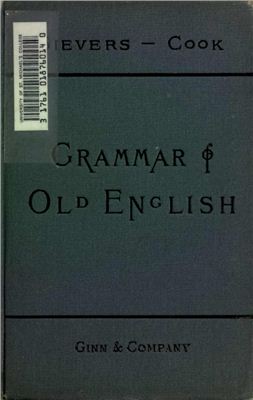Ginn & Co.: Boston 1887,pp. 304
Hitherto, Old English grammars have virtually been founded upon the language of the poetical texts. This is to be deplored, especially when we consider that the manuscripts in which they are contained are uniformly late; that the texts themselves were composed at an earlier period, and frequently in another dialect; and that in our present versions ancient forms are almost hopelessly jumbled with more mode ones, and specimens of the most widely separated dialects are occasionally united in the same composition.
In the present treatise, on the other hand, the language of the older prose writings has, to a greater extent than heretofore, been chosen as the basis of grammatical investigation, since it is safe to assume that they represent in some measure a single dialect. Besides the characterization of the West Saxon, which is everywhere made the most prominent, an attempt has also been made to give, though in the most concise terms, the chief variations of the other dialects.
Hitherto, Old English grammars have virtually been founded upon the language of the poetical texts. This is to be deplored, especially when we consider that the manuscripts in which they are contained are uniformly late; that the texts themselves were composed at an earlier period, and frequently in another dialect; and that in our present versions ancient forms are almost hopelessly jumbled with more mode ones, and specimens of the most widely separated dialects are occasionally united in the same composition.
In the present treatise, on the other hand, the language of the older prose writings has, to a greater extent than heretofore, been chosen as the basis of grammatical investigation, since it is safe to assume that they represent in some measure a single dialect. Besides the characterization of the West Saxon, which is everywhere made the most prominent, an attempt has also been made to give, though in the most concise terms, the chief variations of the other dialects.

